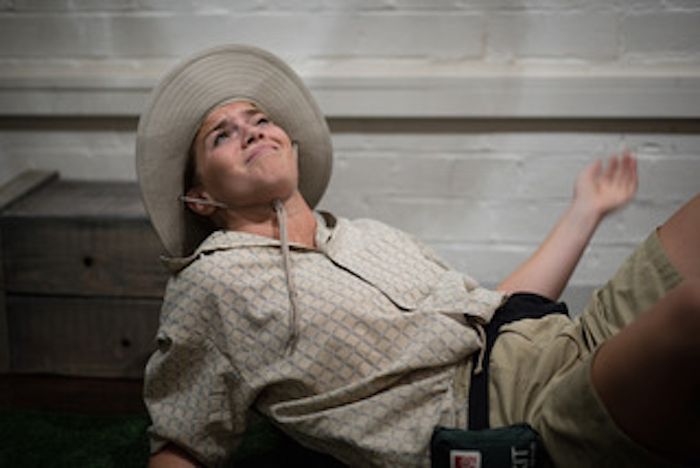As we all know, boys or young men usually performed “the woman’s part” in Elizabethan theatre. After Rosalind and Orlando have fallen in love at first sight, they both for different reasons find themselves exiled from the court and wandering in the Forest of Arden.
Rosalind, who has disguised herself as a man, becomes the confidante of Orlando, teaching him how to woo his apparently lost love. Do we have anything more than a sustained Shakespearean playfulness as a man takes lessons from a boy performing a girl disguised as a boy? Does the play fall short because a girl (the excellently feminine and ferocious Amy Hack) disguised as a boy giving Orlando played by a woman (a charmingly earnest Kelly Robinson) lessons about the nature – as constructed by the Elizabethan patriarchal society but remarkably enduring – of women.
Just the wonderful fact that we are not longing for Orlando to be played by a male, and that both situations equally enable an exploration of the ways in which perceived roles restrict the freedom of both men and women to relate meaningfully. When Orlando believes he is talking to Ganymede (the name assumed by Rosalind) he can express his love more openly and fully than if he were addressing Rosalind in the prescribed sentimental terms illustrated in the poetry he pins to the trees.
Rosalind as Ganymede-pretending–to-be-Rosalind in order to tutor Orlando, is able to become closer to the man she loves than would be possible as a woman. She tests his patience and the strength of his proclaimed love and importantly, makes him feel her inferior. However, despite the power and freedom Rosalind achieves, and her ability to resolve the love problems of several couples, she must, to achieve her own goal – marriage with Orlando – reveal herself as a woman. Will she lose the self-determination she has gained?
That Rosalind is given the final say, the epilogue usually spoken by males, suggests that the new order established on the happy pair’s return to the court, will be more flexible. This She Shakespeare production goes further dividing the epilogue between the entire cast, expressing the hope that while women may still struggle for parity in the theatre industry, they are claiming their place as equal players. In what might seem an undeniably male role, that of Touchstone, Charlotte Tilelli gives a convincing display of irrepressible testosterone.
It is impossible considering the multiplicity of characters to do justice to this exuberant performance in a brief space but the cast as a whole, Courtney Bell, Michelle Cameron, Rebecca Day, Lauren Dillon, Prudence Holloway, Sonya Kerr, Lana Kershaw, Emma Louise, Cassady Maddox sustained both the fun and the tempo throughout. Congratulations to all, and a special commendation for the musicality of the performers as well as the initiative of one Amiens who conducted a latecomer to her seat.





